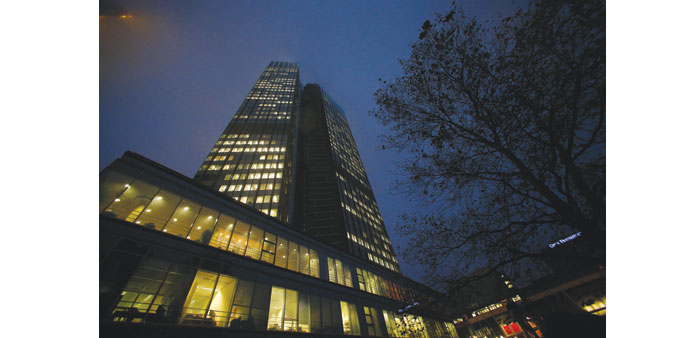The headquarters of the European Central Bank in Frankfurt. Since the ECB began injecting money into the financial system by purchasing bonds in a policy known as quantitative easing, the region’s equities have lost more than 5%.
Bloomberg
London
Even before Thursday’s selloff in European equities - among the worst this year - there was evidence investors were growing more sceptical that Mario Draghi’s measures would lead to stronger corporate-profit results.
While the European Central Bank (ECB) president had hinted that more stimulus was on the way, investors had increasingly sought the most expensive stocks in the hopes that stable earnings growers such as Spanish retailer Inditex would prove to be a haven. The result was the biggest gap in at least a decade between the shares of companies with the highest and lowest valuations.
Since the ECB began injecting money into the financial system by purchasing bonds in a policy known as quantitative easing, or QE, the region’s equities have lost more than 5%. Not even a bigger intervention from the ECB would have turned the tide, according to Didier Duret at ABN Amro Bank.
“The divergence in Europe is far beyond QE,” said Duret, chief investment officer of ABN Amro’s wealth-management unit. He says the valuation gap between expensive and cheap shares won’t narrow any time soon. “There is a very strong fundamental logic behind it, which outweighs anything Draghi does. The market is very selective.”
The central bank cut one of its key rates yesterday and pledged to both extend and broaden QE. But a protracted banking crisis, years of sluggish economic growth and miss after miss in earnings have taken their toll on sentiment. The Stoxx Europe 600 Index on Thursday closed 10% below the record it reached in April.
While France’s Societe Generale and Spain’s Banco Santander trade below 10 times estimated earnings, Inditex has a multiple of 33, near a record, data compiled by Bloomberg show. The priciest fifth of the companies in the Stoxx 600 are valued at an average of 37 times estimated earnings - more than triple the cheapest shares.
After a swathe of earnings upgrades at the beginning of the year, analysts turned pessimistic in May, according to a Citigroup Inc indeindexx tracking the number of increases versus cuts to profit estimates. Forecasts for 2016 earnings growth are the second-lowest since 1988 at this time of year, Barclays calculations show.
Morgan Stanley is echoing the bearish sentiment, noting regulatory headwinds to bank earnings among contributors to why its strategists expect overall corporate profits to rise just 1% next year. In a note dated Nov. 29, they cut their allocation to European equities, saying an improving economy, a lower euro and more stimulus won’t be enough to kick start further gains. Banks will probably fare the worst on the earnings-growth front next year, estimates compiled by Bloomberg show.
Trading around 10 times projected earnings, lenders are among the cheapest of the 19 industry groups on the Stoxx 600. Their valuations are almost half what they were six years ago. Since they make up 11% of the benchmark index, sluggish performance is also bringing down the overall market.
For JPMorgan Asset Management, the extreme divergence signals a buying opportunity for stocks that have lagged since the financial crisis, especially if global growth concerns fade. The MSCI Europe Value Index - tracking the cheapest, often riskiest companies - is now at a 15-year low versus the MSCI Europe Growth Index, which follows companies with a track record of improving earnings even when times are tough.
“If cyclicals just get a piece of good news, then they could really be the surprise performers next year,” said Stephen Macklow-Smith, the London-based head of European equity strategy at JPMorgan Asset, which manages $1.7tn. He recommends stocks geared toward the European recovery, such as food retailers and some financials. “Europe has attractive valuations, an improving economy and profit growth: whatever happens in the short term, markets will be making headway again in the next three months.”
The Stoxx 600’s valuation of about 15 times estimated profits is still lower than the multiple of 16 for the Standard & Poor’s 500 Index.
But disappointing profit growth, the lack of corporate investment, and fears of another economic downturn are made worse by the ECB’s moves, according to Saxo Bank’s Teis Knuthsen. The central bank cut its inflation outlook for the next two years yesterday because the recovery isn’t picking up quickly enough.
“There’s a strong narrative that the economic performance is subpar,” said Knuthsen, chief investment officer at Saxo’s private-banking unit. “There’s so little confidence in the European recovery story that even the bulls are buying high.”

